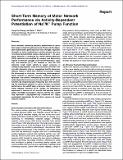Short-term memory of motor network performance via activity-dependent potentiation of Na+/K+ pump function
Abstract
Brain networks memorize previous performance to adjust their output in light of past experience. These activity-dependent modifications generally result from changes in synaptic strengths or ionic conductances, and ion pumps have only rarely been demonstrated to play a dynamic role [1,2,3,4]. Locomotor behavior is produced by central pattern generator (CPG) networks and modified by sensory and descending signals to allow for changes in movement frequency, intensity, and duration [5,6,7], but whether or how the CPG networks recall recent activity is largely unknown. In Xenopus frog tadpoles, swim bout duration correlates linearly with interswim interval, suggesting that the locomotor network retains a short-term memory of previous output. We discovered an ultraslow, minute-long afterhyperpolarization (usAHP) in network neurons following locomotor episodes. The usAHP is mediated by an activity- and sodium spike-dependent enhancement of electrogenic Na+/K+ pump function. By integrating spike frequency over time and linking the membrane potential of spinal neurons to network performance, the usAHP plays a dynamic role in short-term motor memory. Because Na+/K+ pumps are ubiquitously expressed in neurons of all animals and because sodium spikes inevitably accompany network activity, the usAHP may represent a phylogenetically conserved but largely overlooked mechanism for short-term memory of neural network function.
Citation
Zhang , H Y & Sillar , K T 2012 , ' Short-term memory of motor network performance via activity-dependent potentiation of Na + /K + pump function ' , Current Biology , vol. 22 , no. 6 , pp. 526-531 . https://doi.org/10.1016/j.cub.2012.01.058
Publication
Current Biology
Status
Peer reviewed
ISSN
0960-9822Type
Journal article
Collections
Items in the St Andrews Research Repository are protected by copyright, with all rights reserved, unless otherwise indicated.

